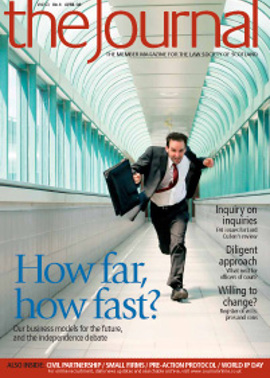CPD: the way forward

Some of you will have seen the article (Journal, January 2008, 28) highlighting the themes of the current Education and Training Review Working Party. The recommendations relating to the pre-qualification stages (Foundation; Professional Education and Training stages 1 and 2) have now been issued (for the full documents see www.lawscot.org.uk/training/consult/dfg.aspx ), with those relating to post-qualification due shortly. The Society welcomes responses from the profession to these recommendations.
As leader of the Continuing Competence, Professional Development project, I would like to explain some of the background to our thinking on the whole area of continuing professional development (CPD).
At the outset of the current “cradle to grave” review, the Education and Training Committee developed some important themes that they wanted to investigate and consult on in relation to CPD. These included the length of the review cycle, whether there should be a move away from hours completed to units undertaken, the possibility of accreditation of training providers, the introduction of formal personal development planning, the development of career milestones, and how the system should be monitored. These themes were consulted on in the online consultation carried out in 2006. Responses from the profession indicated that competent solicitors keep up-to-date with the law without the need for any formal process, and that some members were paying only token regard to what was currently required by the Society.
Quoting one member illustrates the feeling that: “Competent solicitors keep updated on the law on their own…. CPD is not a choice but part of what a solicitor does to stay the best solicitor they can. Competent solicitors share what they have learned with colleagues.”
The Society’s role
As a result of such comments, the working party felt that it was important to identify the role the Society should play in imposing formal requirements for CPD. Given that most members invest considerable time and resources into maintaining their ongoing competence, it felt that any changes to the current system must allow people to demonstrate what they do in a way that would not add too much additional paperwork, and that the range of what was currently formally recognised should be extended. It was also felt important to allow people to gain credit for significant long-term development projects, at the same time as ensuring that people were undertaking training directly relevant to their area of work.
The recommendations that will be issued soon, reflect those overarching principles and we welcome comments from members about how they think the recommendations will work in practice.
Taking time out I would like in this article to highlight two areas of importance. First of all, how the proposed changes are aimed at helping busy professionals recognise and demonstrate the investment they make in their ongoing competence, and secondly, the value that can be derived from taking some time each year to stop and reflect on our training and development needs.
Accepting that all good professionals try to ensure that they keep themselves up to date automatically, most of us know how difficult that can be at times. Experience of legal practice enables us to assess what kind of technical training we need, depending on changes in the law or procedures. However, sometimes we:
- are simply too busy to find the time to do what we mean to do;
- cannot seem to find the “right” training;
- sometimes have to cancel training at the last minute due to urgent client work;
- spend money on a course without assessing whether it will provide real value;
- get “sent” on courses with no input from ourselves; and/or
- leave it to the last minute of our annual hours and then choose whatever is available at that point in time, whether relevant to us or not.
One of the best ways to help address all of these points is to take the time at least once a year to think about where we are in our careers, what changes have happened over the past few months, what gaps we now have in our knowledge and/or skills, and assess what we need to do to fill these gaps.
Learning from outcomes
Another aspect of being too busy to stop and think is that we learn our craft by doing the job, not by going on training courses. Learning as we go along is therefore not formalised or regulated in any way, and this means that often we are not able to appreciate what we have actually learned. We can learn in a variety of ways, which can include discussing the details of a file with a colleague, explaining to a less experienced member of staff how to tackle a problem, and preparing a detailed explanation of a complicated area of law to a client. It is therefore difficult to capture all of this learning on a daily basis.
As most of us know, our most memorable learning experiences come from when we get something wrong, with the result that we often fail to notice the learning we have achieve when we get something right without any apparent effort. It is important to ensure that we are able to reflect on what we learn in the random and haphazard way that occurs in professional practice.
The working party has taken these points on board and wants to ensure that any changes to the current CPD system will help members of the profession choose the right training and development option for each stage in their career, and demonstrate to ourselves and outsiders the learning we achieve and the investment we make on an ongoing basis in CPD.
Fiona Westwood, Project Leader, Continuing Competence, Professional Development Project
In this issue
- Thinking ahead
- A line too often crossed
- Big leap forward
- Independence: still viable?
- FAIs: a new lease of life
- ARTL: Turquoise is in the pink
- Summary trials: deciding the facts
- Life at the sharp end
- Conscience and public service
- Wills and ways
- Achieving "senior" rates?
- CPD: the way forward
- Life on the edge
- Pre-action protocol for industrial disease claims
- Fit a doin'?
- Same difference
- Curiosity corner
- System? What system?
- Reviewing appeals
- Testing insolvency
- Scottish Solicitors' Discipline Tribunal
- Website reviews
- Book reviews
- Day of creation
- Lawyer behind the camera
- Homing in on home reports






